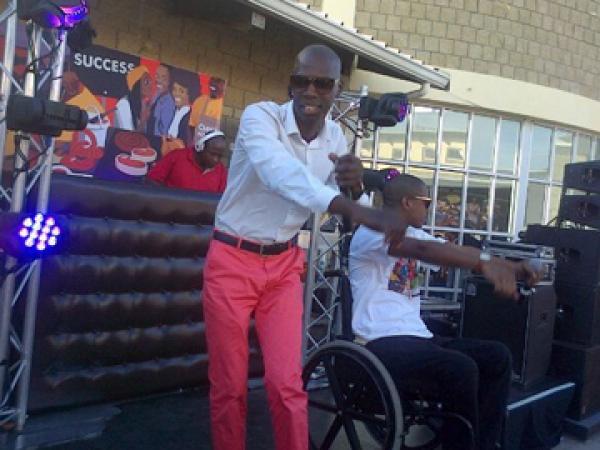Kwaito duo Ruffest keep innovating

Starting off in 2004 as Kasi Vibes, kwaito duo Sello Mangwana (29) and Andile “Max” Stemela (31) reinvented themselves as Ruffest in 2007. It was the beginning of the rise of two musicians from Nyanga.
Khawundenze Ndonwabe was the song that introduced Ruffest to South African audiences in 2009. The song was a constant feature at events because it spoke about having a good time.
Mangwana and Stemela could easily be mistaken for siblings. Their bond is tight, on and off stage, and the duo’s onstage chemistry with their coordinated clothing and choreography makes them among the best performers in Cape Town, delivering memorable performances with audiences often singing and dancing along.
Their families are supportive. Max’s mother Angelina said, “I am proud of him for not giving up and for taking up something he is passionate about, [and] which earns him more respect amongst his peers in the community.”
In 2011, Ruffest independently released an EP titled Sesi Ngenile, which they distributed at gigs. The duo also featured on a single titled Sebenza, on an album distributed by Soul Candi.
With the decline in the popularity of kwaito across the country, the duo say they have managed to stay relevant by collaborating with artists from other genres and also following new trends. In 2012, Ruffest collaborated with Richard the III on a single titled Emazweni. They have also recently collaborated with hip hop producers and artists Mix’n Blend, Pyro Beats and Ace V.
Phindile George has been managing Ruffest since 2011. He says the journey with Ruffest as “an amazing roller-coaster of a mixture of hardships, fun, success and a learning curve”.
The duo describe the Cape Town music scene as one of the toughest, most diverse and dynamic in the country. Ruffest point out that the city hosts several international festivals but needs more corporate support and unity among the main players. In terms of media support, the group feels that there could be more support for local artists from radio and television.
“There is a lack of resources and businesses willing to invest in the Cape Town local music scene,” says Max. Artists struggle if music is their sole source of income. But Sello says it is possible to take up music as a career if you are determined to succeed and be professional.
Sello says musicians “must understand that they are always a brand”: “Everywhere they go they are ambassadors for the trade. Always be ready to sell your services and be innovative.”
Acknowledging the struggle faced by the youth of Nyanga, the duo have started to host motivational talks to raise awareness about drugs and crime.
Listing their career highlights so far, Ruffest mentioned performing at Rocking the Daisies in 2011, competing in the Red Bull Beat Battle 2012, and Soul Candi Sessions 2014.
Ruffest is planning to release more singles this year and explore other avenues. They say they would love to collaborate with talented Cape Town individuals and bands such as Sibot, Das Capital and Youngsta.
You can follow @Ruffest1 on twitter and join the ‘Ruffest Kwaito’ fan page on Facebook.
Support independent journalism
Donate using Payfast

Don't miss out on the latest news
We respect your privacy, and promise we won't spam you.
Next: Protest at Cape Town Pride
Previous: Marikana: a wake-up call

This article is licensed under a Creative Commons Attribution-NoDerivatives 4.0 International License.
